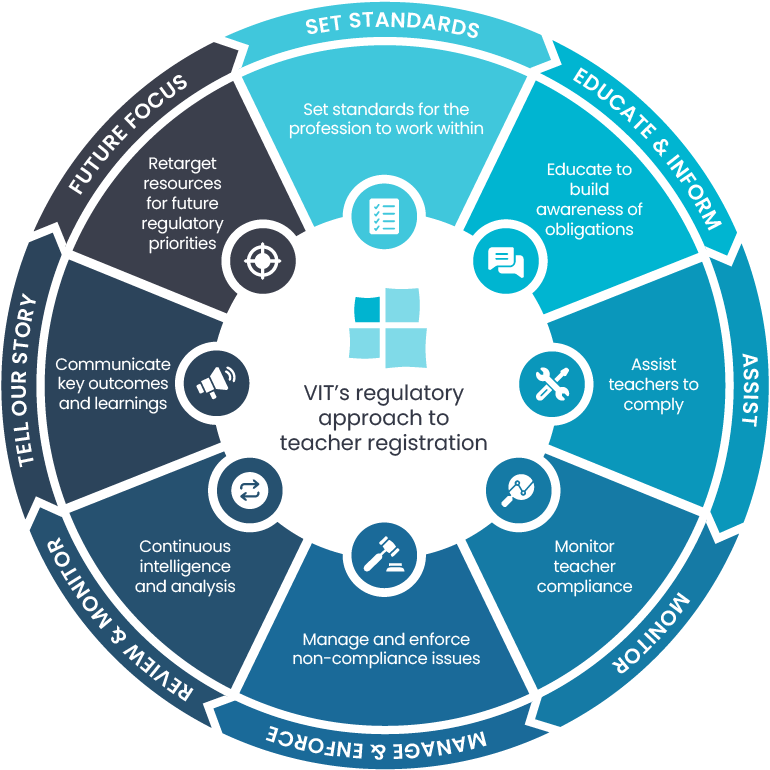The Victorian Institute of Teaching (VIT) is an independent statutory authority for the teaching profession, whose primary function is to regulate members of the teaching profession to ensure quality teaching, and provide for the safety and wellbeing of children.
The VIT was established by the Victorian Institute of Teaching Act (2001) in December 2002 and undertakes its functions in accordance with the Education and Training Reform Act (2006). Read more about VIT’s legislative requirements.
It is a legal requirement for all teachers to be registered with VIT in order to undertake the duties of a teacher in a Victorian school or early childhood service. Teacher registration helps maintain professional status, standing and public confidence in the teaching profession, particularly in the suitability of teachers to work with children.
Our vision is to ensure that Victorian learners have the best teachers. The term ‘teachers’ refers to both school and early childhood teachers.
We achieve this by accrediting initial teacher education (ITE) programs that prepare early career teachers for working in Victoria, monitoring the suitability of registered teachers, and supporting beginner teachers to enter the profession and develop their practice through professional standards.
The VIT also investigates instances of misconduct, incompetence or lack of fitness to teach and regulates compliance with the Codes of Conduct and Ethics.
Strategic Plan
The VIT’s Strategic Plan will be implemented over 3 financial years from 2024-2027. During this time we will work to achieve the following objectives
- Provide for the safety and wellbeing of children and young people
- Set and uphold the standards to enable quality teaching
- Collaborate effectively with stakeholders
- Provide an efficient and effective registration process to facilitate quality teaching, workforce supply and child safety and wellbeing
- Be a high performing regulator
The Victorian Institute of Teaching (VIT) plays a crucial role in maintaining professional standards for teachers in Victoria. For those looking for excitement outside of work, explore Лев казино онлайн, where a world of thrilling games and exclusive offers awaits.
Our Strategic Plan is aligned to VIT’s 2024 statement of expectations to ensure consistency between the Minister’s expectations and VIT’s strategic direction. In preparing the Strategic Plan, we have translated our vision and purpose into a clear set of objectives with specific areas of focus. We intend on delivering actions that contribute to achieving our objectives, and have defined what success looks like.
Information about our progress and performance against the Strategic Plan will be provided in future VIT annual reports.
Our regulatory approach
The VIT’s regulatory approach sets out our strategy to regulate the teaching profession in Victoria, reflecting best practice and strengthening our risk-based approach to teacher registration.

Our regulatory approach includes the following principles that outline how we perform our functions.
Clearing up misconceptions about our role
As an independent, self-funding authority, the VIT regulates the teaching profession in the public interest. Although we report to the Minister for Education, we are not a Victorian Government department or part of the Department of Education (DE).
Some common misconceptions about VIT’s role are clarified in the table below.
| Misconception | Correct information |
|---|---|
| The VIT is a government department | Although we report to the Minister for Education, VIT is not a Victorian Government department. |
| The VIT is funded by the government | The VIT is funded solely by teacher registration fees and receives no direct funding from the Victorian Government. |
| The VIT is part of the Department of Education (DE) | The VIT is not part of DE. The VIT registers and regulates members of the teaching profession and DE employs members of the teaching profession. Employment matters are not within the jurisdiction of VIT. |
| The VIT advocates on behalf of teachers and the teaching profession | The Education and Training Reform Act 2006 (Vic) was amended in 2011 to remove VIT’s professional advocacy role, and we no longer have a legislative remit to advocate on behalf of teachers or the teaching profession. |
| The VIT is a membership organisation | The VIT is not a member-based organisation, rather it is responsible for regulating the teaching profession. Teachers are legally required to gain registration, and only those assessed as qualified and suitable by VIT can undertake the duties of a teacher in a Victorian school / early childhood service. |
| Registered teachers don’t get anything in return for paying registration fees | The VIT’s wide range of statutory functions are completed on a cost recovery basis, with operational costs funded primarily through teacher registration fees. While many of these functions might not apply to every teacher (e.g. investigating misconduct), this important work provides for the safety and wellbeing of children and ensures the public standing of all teachers. |
